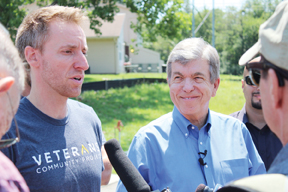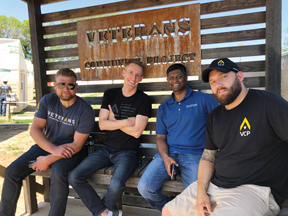
When former Missouri Secretary of State Jason Kander stepped out of the public spotlight to seek treatment for PTSD, he found the paperwork process at the Veterans Affairs clinic overwhelming.
He “was looking at the possibility of having to wait weeks to possibly months to start being able to see somebody at the mental health clinic for the VA, the PTSD clinic, and found that even somebody in my position with a phone full of influential contacts and pretty high-level government experience and a law degree that I was a little — I don’t want to say overwhelmed or intimidated — but I was a little blown back by how onerous that process was going to be in aggregate,” Kander said.
Kander turned to the Veterans Community Project (VCP), which provides help to any veteran needing social or medical services, transportation help and even housing.
“I ended up coming in and getting the same kind of treatment that over 6,000 Kansas City veterans have gotten, which is help with whatever I needed and in my case what I needed was help navigating the paperwork process at the VA and because of VCP, ended up being able to get through that process quickly and right into mental health treatment really quickly,” said Kander, who is Jewish.
Now he’s in charge of overseeing the organization’s expansion from being an entity specific to Kansas City to potentially eight other cities by the end of 2022. They’re about to break ground in the first expansion city, Longmont, Colorado.
Kander first heard about VCP from its co-founder Bryan Meyer, who had volunteered on his secretary of state campaign and truly connected with it on a tour during his mayoral campaign.
“I’ve been on a ton of nonprofit tours. This one really grabbed me, and I was so impressed by the innovation of it, by the results of it, and I remember going home and telling my wife, Diana, that man, I wish I could just quit everything I’m doing and just work with these folks,” Kander said.
His experience developing Let America Vote, a national political action committee that fights attempts at voter suppression, has been an asset in working on VCP’s expansion.
Besides just dealing with governmental red tape, another problem veterans face is that not all of them qualify for services through the VA. A less-than-honorable discharge or a shorter term of service might mean they have issues associated with their service but no obvious way to get help with them.
At VCP, as long as you’ve spent one day in military service, you qualify for their help. So far, they’ve served more than 4,000 individuals in some way.
Both Kander and Meyer emphasized that the support of the city has been key to VCP’s success. Help from local companies and donors has been vital, as VCP operates on grants and donations and not federal funding.

The most popular program they have is a deal with Kansas City, Missouri, to provide free bus passes to veterans. They’ve given out about 3,700 bus passes already.
“We fill in the gaps in veterans services,” Kander said.
Often that means connecting veterans with other social service programs in the area. However, VCP’s more visible imprint is a tiny house community near 89th Street and Troost Avenue.
Veterans with PTSD often feel uncomfortable in group housing situations like homeless shelters, so to have tiny houses that provide individual space — and a lock on the door — is valuable in helping them transition from homelessness to being ready for a more permanent housing situation.
That’s especially important for female veterans.
“We probably have a higher representation of female residents in our village. If you’re homeless as a female, shelters and group living can be higher risk,” Meyer said.
Currently, there are 26 houses, but VCP will open up an additional 23 houses and a small community center for the residents in December. Forty-four people have lived in the houses so far.
Typically, people spend eight to 24 months living in the houses and working with case managers multiple times a week. Residents range in age from 20s to 80s and have served in a multitude of different conflicts and in peacetime.
“The operative word is community. … It recreates the last time in their lives they were really stable, which was when they were in the military. It’s a lot like base housing. And so as a result, they really support each other,” Kander said.
To keep it going, Kander said VCP needs both donations and help making the right connections in other cities where they might expand.
“I think this is clearly a tikkun olam sort of project, at least it is to me,” Kander said.



